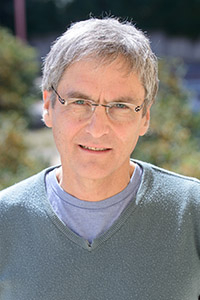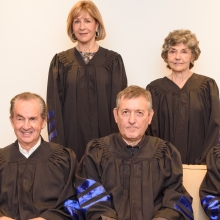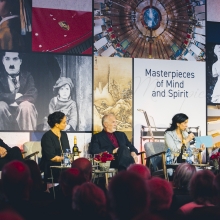A future in plain sight
Sariel Salmon’s story of grace under fire
Students

Sariel Salmon on graudation day
A famous Jewish proverb states: “I ask not for a lighter burden, but for broader shoulders.” Few people embody this sentiment with as much earnestness as 28-year-old Sariel Salmon, a recent Weizmann Institute MSc graduate, who at the age of 16 woke up from a surgery to find herself completely blind.
Despite being plagued by health issues since infancy, Sariel has unflaggingly pursued her dreams, determined to turn her hardships into opportunities. When she was just a year old, she was diagnosed with hydrocephalus—a condition in which cerebrospinal fluid accumulates within the brain, causing increased pressure inside the skull. This required the placement of a shunt that would drain the excess fluid from her brain to her intra-abdominal cavity. It was the first of several emergency operations she would have to undergo.
While this is a routine procedure today, at the time of her first surgery 26 years ago, the risk was very high and survival rate was extremely low.
Her condition brought with it a slew of physical impairments—including limited motion on the right side of her body, an inability to walk, and bouts of intense vertigo. It also meant repeated trips to the hospital throughout her childhood and adolescence in order to replace the shunt.
But for Sariel, her main concern was continuing the schoolwork and extracurricular activities which meant everything to her. A star pupil in school who volunteered with Magen David Adom and the city youth council, Sariel was an extremely active girl.
Then, at 16, she suddenly slipped into a coma. A subsequent surgery woke her up, but at the cost of her sight. During the operation, the visual processing center of her brain had been accidentally damaged, resulting in permanent blindness. And yet, a mere two months later, she was back in school, insisting to her incredulous teachers that she be allowed to take the level 5 (highest) matriculation exams in math.
“The way I see it,” Sariel says, “is that the surgeons were able to wake me up. That was my takeaway. Yes, I lost my sight, but so what? It was a happy ending: I was alive. The most important thing to me is to continue being able to learn, to give back to people, to do good for others. And I was determined to do that with or without my sight.”
Since the surgery, Sariel’s ability to see oscillates—from being able to only make out vague splotches of color to being able to read some words if the letters are large enough.
Brightening the lab
After completing high school and her national service, Sariel went on to study biology and physics at the Hebrew University of Jerusalem.
She used software programs that read out her course material for her, and paid friends and colleagues to read material out loud to her. Many of them became her best friends, and even one of them—another undergraduate physics student, Ben—became her husband. Ben volunteered to help Sariel read her math material for her physics courses, and they quickly became best friends. One night, after ten months of close friendship, they found themselves outside the library in Givat Ram trying to see if Sariel could see the light from the stars.
“It was a very romantic move on Ben’s part,” Sariel reminisces. “And our friendship blossomed into a relationship.”
After graduating from the Hebrew University, Sariel and Ben both came to the Weizmann Institute in 2016 to pursue their MSc. While Ben studied physics education, Sariel joined Prof. Ehud Ahissar’s lab in the Department of Neurobiology, where she studied how rodents use their whiskers to perceive their environment.
It was a research focus that was driven by her own circumstances. Her childhood doctor took a scientific approach to his treatment of her condition in a way that fascinated her; she credits his quick instincts and ability to think outside the box for keeping her alive. During one of her surgeries, she was exhibiting all the symptoms of high pressure in the brain, but when her doctor saw that the correlating treatment made her situation deteriorate rapidly, he quickly switched tactics and treated her for the opposite problem, saving her life.
During her master’s studies, Sariel gave birth to her first child, and completed her degree with a 95% grade average. She continues to work in the Ahissar lab as a lab technician, and is contemplating pursuing her PhD.
“When Sariel first came to my lab, it felt like the light that she had been denied was instead radiating from her, brightening the whole lab,” says Prof. Ahissar. “Our team performed an exercise that we named the ‘Sariel experience,’ which involved riding bicycles in the total dark. Through it, we got a better understanding of how much courage it takes to live as Sariel. Yet, the greatest ‘Sariel experience’ for me is the science she produces. She allows herself no concessions and the results are always exceptional.”
Sariel expresses her appreciation and gratitude to the Weizmann Institute for providing her with the means and resources to conduct her studies.
“The Weizmann Institute has always been there for me,” Sariel says. “Anything I needed—all I had to do was ask and they supplied it.
They provided me with a disability-friendly apartment close to campus. They made completing my coursework and research as obstacle-free as possible. It is an amazing place to work. And the rest: It’s all about having a positive outlook. Einstein said: ‘In the middle of difficulties lies opportunity.’ This is what I try to live by. I feel it is my duty to tell my story, to inspire others to change their perception and make the most of their lives.”

Prof. Ehud Ahissar








